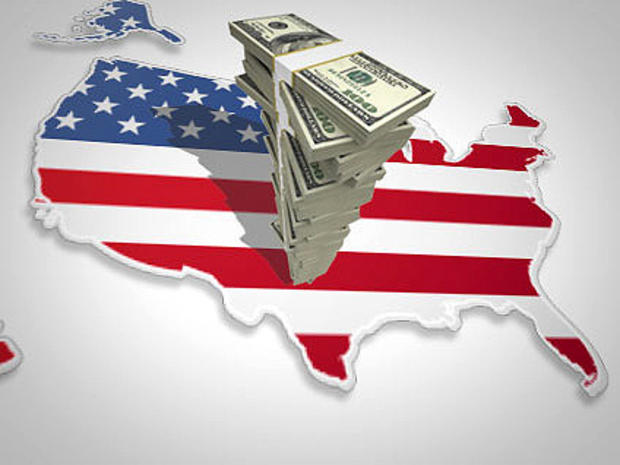What Deficit? Tax Deal Comes With Major Costs
The "framework" laid out by President Obama that extends the Bush tax cuts for all Americans for two years, cuts payroll taxes, reinstates the estate tax, and extends unemployment insurance benefits for 13 months, among other components, has given lawmakers and pundits plenty to argue about.
But there's one thing they should be able to agree on: The package doesn't come cheap. And it signals that both Democrats and Republicans, despite their professed concern about America's debt problem, do not see dealing with it as a priority, at least in the short term.
Consider: The top concession to Republicans - the two-year extension of the Bush tax cuts for the highest earners - comes at a cost of about $60 billion per year. To save that much money, lawmakers would have to eliminate earmarks, enact Mr. Obama's proposed federal pay freeze, cut the federal workforce by 10 percent and cut foreign aid in half.
The top concessions to Democrats is the 13-month extension of unemployment insurance benefits - which will cost another $56 billion - along with the expiring Earned Income Tax Credit, Child Tax Credit and American Opportunity Tax Credit - which adds another $40 billion to the price tag.
The payroll tax cut included in the bill will cost another $120 billion. If the deal goes through, that means a significant reduction funding for Social Security and Medicare - despite the fact that those entitlement programs are already on shaky ground thanks to the aging Baby Boomer population.
Add up all the costs from the bill, in fact - which also includes a write-off for business investments and changes to the Alternative Minimum Tax - and you're looking at a price tag of at least $900 billion over two years, according to Moneywatch's Jill Schlesinger. The price tag on Mr. Obama's stimulus package that so angered the Tea Party movement? As of this summer, the Congressional Budget Office estimated it at $814 billion.
The White House insists that the agreement "does not worsen the medium- and long-term deficit." In a fact sheet sent to reporters today, it said Mr. Obama planned to keep the tax cuts on the richest Americans from becoming permanent, which he has said repeatedly would cost $700 billion over a decade.
"These are responsible, temporary measures to support our economy that will not add costs by the middle of the decade," the White House said.
Those who agreed to the deal appear to have calculated that the still-struggling economy means that concerns about the deficit and national debt need to be put aside until the economy improves. And this agreement, they say, will help that happen by encouraging businesses to invest and Americans to spend the additional money they find in their paychecks.
In this line of thinking, the short term cost of spurring the economy will be made up by the long-term benefits of a more vibrant economy. The payroll tax cut, the White House said, "is widely recognized by economists across the political spectrum as a high bang for the buck way to boost growth."
Indeed, while no one is using the word, the tax cut deal amounts to something of a stealth stimulus package. But while the actual stimulus bill, which was roughly one-third tax cuts, was vilified by Republicans, this bill appears to have support from many GOP lawmakers, particularly in the Senate.
The strongest opposition to the agreementso far is, in fact, coming from House Democrats, who say the tax cut for high earners is a waste of money that will do little to help the economy. Rep. Peter Welch (D-Vt.) called the plan "fiscally irresponsible," while Rep. John Conyers (D-Mich.) said the agreement "will be vehemently opposed by many if not most Democrats, progressives, and some Republicans who are concerned with the country's financial budget."
The agreement provides a conundrum for self-styled Tea Partiers, who have pushed for tax cuts - but also fiscal discipline. Rep. Michele Bachmann (R-Minn.), leader of the House Tea Party Caucus, says she is not yet sure how she would vote on the deal.
In the Senate, Vermont's Bernie Sanders, an independent who caucuses with Democrats, is promising to do everything he can to block "more tax breaks for billionaires who don't need it." And retiring Republican Sen. George Voinovich of Ohio called the agreement "completely irresponsible."
Americans, he said, "should know that a lot of the reduction of their taxes is borrowed money from China."
In an interview with Hotsheet, Rep. Welch, who describes himself as progressive, elaborated on his opposition the deal.
"We're making a trillion dollar decision that's going to add that much to the debt in two years," he said.
Tax Cut Deal Reveals Obama 2.0
For Obama, Championing Compromise May Be Lonely
Obama: Deal with GOP on Tax Cuts
Tax Cuts For All Americans?
GOP Win on Taxes Leaves Some Dems Fuming
Obama Faces Liberal Revolt over Tax Cut Deal

